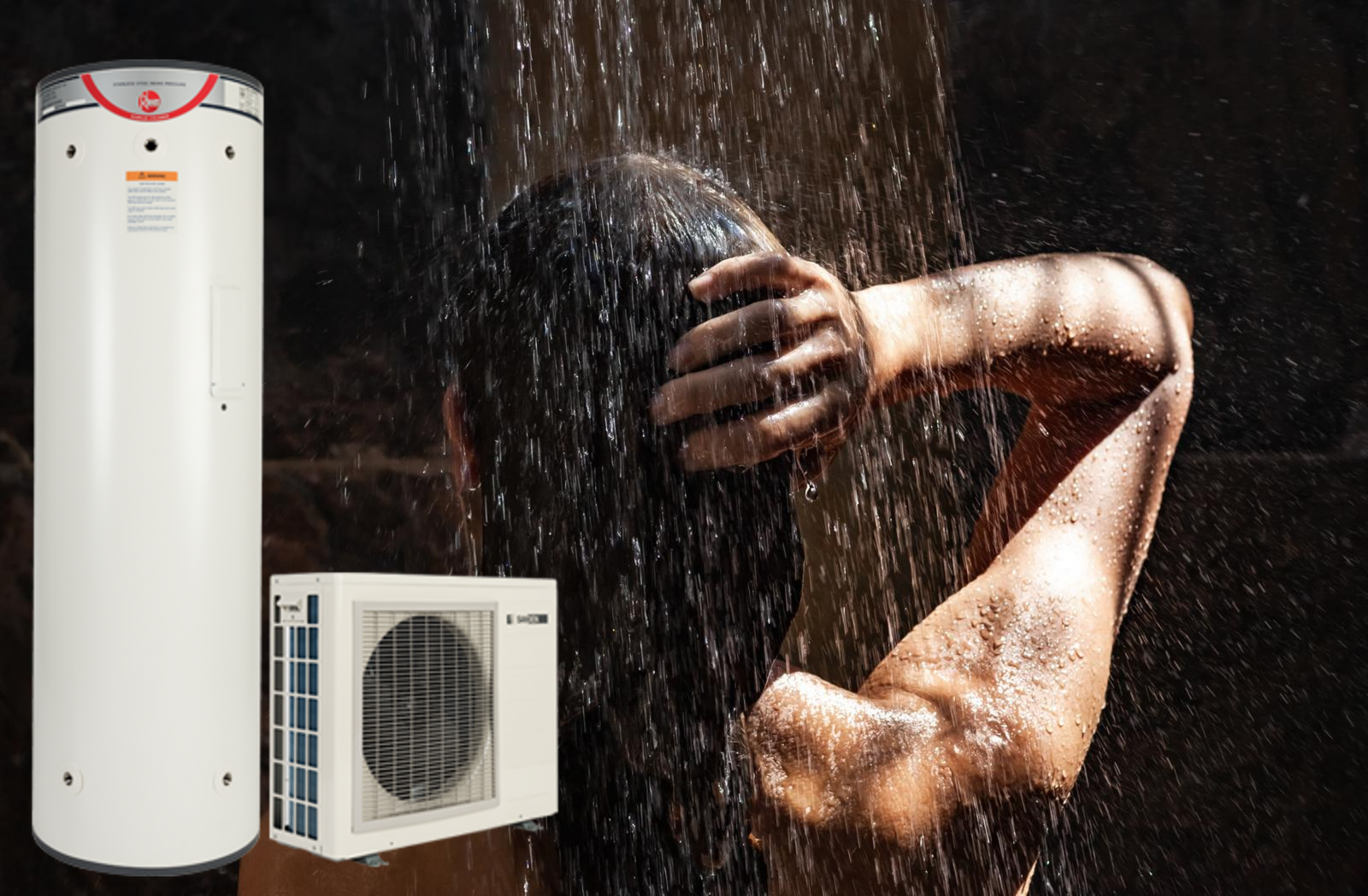Most people are familiar with heat pumps as an efficient solution for heating their home. But did you know the same technology can be used to heat your hot water?
A hot water heat pump (HWHP) is an appliance that uses heat pump technology to heat the water in your hot water cylinder. The device consists of a heat pump, a hot water cylinder and a control unit.
The heat pump is powered by electricity and works by extracting heat from the air and transferring it to the water. The hot water cylinder is insulated to keep the water hot. The control unit regulates the temperature of the water and the operation of the heat pump.
Split System Hot Water Heat Pumps
Some HWHP are located outside the home. Others use a split system. The split system consists of two main parts: an outdoor unit containing the compressor, condenser and expansion valve, and an indoor unit containing the evaporator. The two units are connected by refrigerant piping.
The outdoor unit of a split system hot water heat pump pumps heat from the surrounding air into the hot water tank. The heat is then transferred to the indoor unit, where it is used to heat the living space.
Hot Water Heat Pumps are more efficient
Heat pumps are very efficient because they move heat rather than generate heat. They use less electricity to operate and can save you money on your energy bill.
Generating heat requires a lot of energy, and this is why electric resistance heaters are not very efficient. Electric resistance heaters convert electricity into heat, and this conversion is only about 10% efficient.
Heat pumps, on the other hand, are about 300% efficient, and can save you up to 80%*. This means that for every unit of electricity that a heat pump uses, three units of heat are generated.
The efficiency of a hot water heat pump depends on many factors.
- The most important factor is the temperature difference between the heat source and the heat sink. The higher the temperature difference, the more efficient the pump will be.
- Another factor is the coefficient of performance (COP). The COP is a measure of the efficiency of the heat pump. The higher the COP, the more efficient the pump will be.
- The third factor is the humidity of the air. The humidity of the air affects the efficiency of the heat pump. The higher the humidity, the less efficient the pump will be.
- And finally, the size of the heat pump is important. The size of the heat pump affects the efficiency of the heat pump. The larger the heat pump, the more efficient the pump will be.
Hot water heat pumps are usually more expensive to install than traditional gas or electric water heaters, but they can save you money in the long run.
Hot Water Heat Pumps are environmentally friendly
Hot water heat pumps are becoming an increasingly popular choice for those looking for an environmentally friendly option for heating their hot water. There are several reasons why hot water heat pumps are so much more environmentally friendly than traditional heating methods.
Firstly, as discussed, they are extremely energy efficient – they use far less energy to heat the same amount of water, which reduces your carbon footprint. Secondly, they do not produce any emissions, releasing greenhouse gases into the atmosphere, making them a completely green option.
There are two types of HWHPs: air-source and ground-source. Air-source HWHPs are the most common type. They extract heat from the air and transfer it to the water. Ground-source HWHPs extract heat from the ground and transfer it to the water.
Hot Water Heat Pumps also have a long lifespan and require little maintenance, meaning they are a very cost-effective option in the long run.
Considerations for installing a Hot Water Heat Pump
If you are thinking about installing a hot water heat pump, there are a few things you should know. Here are some tips to help you choose the right hot water heat pump for your home or office:
- Determine the size of the heat pump. Hot water heat pumps are available in a variety of sizes. Choose a size that is appropriate for the amount of water you need to heat.
- Select a heat pump that is Energy Star certified. Energy Star hot water heat pumps are at least 15% more efficient than non-certified heat pumps.
- Choose a heat pump with a warranty. Most hot water heat pumps come with a five-year warranty.
- Have your hot water heat pump serviced regularly. Like any other appliance, hot water heat pumps require regular maintenance. Be sure to have your heat pump serviced by a qualified technician at least once a year.
When shopping for a hot water heat pump, be sure to keep these factors in mind. By doing so, you will be sure to choose a unit that is right for your home and your budget.
* Based on case study and lab test results. Actual results may vary depending on ambient temperature and hot water usage.
